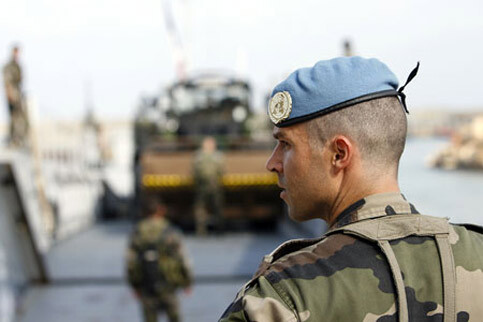United Nations News Service 19 October 2006

A French peacekeeper watches as part of the 170 French soldiers and equipment, the first wave of some 2,000 pledged by France, arrive in Narqoura in southern Lebanon as part of the expanded UNIFIL, 25 August 2006. (UN Photo/Mark Garten)
Considerable progress has been achieved in southern Lebanon since the Security Council resolution ending the conflict between Israel and Hizbollah, and most of the expected force of blue helmets to monitor the cessation of hostilities has now been deployed, the senior United Nations commander in Lebanon said today.
Briefing reporters at UN Headquarters in New York, Maj.-Gen. Alain Pellegrini said the UN Interim Force in Lebanon (UNIFIL) has 7,200 soldiers on the ground, including a contingent of 1,500 Germans that is part of the taskforce designated to protect Lebanon’s maritime boundary.
Resolution 1701, adopted by the Council on 11 August to end the 34-day conflict in the Middle East, allows for up to 15,000 UN peacekeepers, but in response to a question Maj.-Gen. Pellegrini described that figure as a ceiling and said the Mission may not need to have more than about 10,000 soldiers.
“I’m very pleased to be able to report that considerable progress has been made since the adoption of resolution 1701,” he said, describing the deployment as a “rapid expansion’ and noting the mix of European and non-European contributing countries.
The near total withdrawal of Israeli Defence Forces (IDF) from southern Lebanon has been the most significant event since the resolution was passed, Maj.-Gen. Pellegrini said, and had occurred “without any major disruptions.” The Lebanese military has also fully deployed up to the Golan Heights.
“An appropriate solution” is still being sought for the removal of Israeli forces from Al Ghajar, the one village which they still occupy. Al Ghajar is located on Lebanon’s border with the Golan Heights and has Israeli, Lebanese and Syrian citizens.
Maj.-Gen. Pellegrini said the aim would be to have a UNIFIL unit stationed inside the northern part of the village to enable Lebanese armed forces to enter escorted by blue helmets to affirm their authority over that section and to enable Israelis responsible for social and medical support for their citizens to cross the Blue Line.
Israeli breaches of Lebanese airspace remains “our major concern” and they represent a clear violation of the resolution. Although UNIFIL has been dealing with these violations diplomatically, he said the Mission might later use force. “If diplomatic means should not be enough, maybe we can consider other ways.”
In response to a question, Maj.-Gen. Pellegrini said UNIFIL had no evidence of any weapons smuggling from Syria and had also not found any illegal weapons inside the Mission’s area of operations.
Related Links